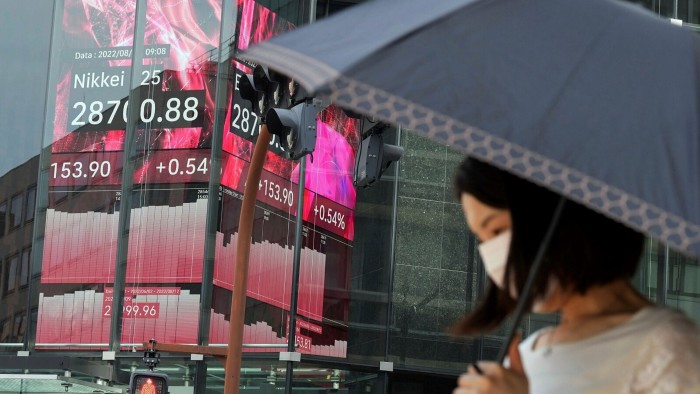Bank of Japan ETF ownership creeps back up to 63%

Simply sign up to the Exchange traded funds myFT Digest -- delivered directly to your inbox.
Latest news on ETFs
Visit our ETF Hub to find out more and to explore our in-depth data and comparison tools
More than a decade after the Bank of Japan decided to buy up exchange traded funds as part of an ambitious quantitative easing programme it owns 63 per cent of all locally listed ETF assets, data for the year to July show.
While the proportion is higher than the 58 per cent ownership recorded last year by ETFGI, a data provider, it is a reduction on the peak of nearly 77 per cent reached in 2017.
Despite some fluctuations, however, one of the anomalies of the Japan ETF market is that the central bank has owned far more than 50 per cent of all Japanese ETF assets since 2016 — a fact that has drawn much scrutiny.
One academic study, for example, found that afternoon returns of component stocks of the Nikkei 225 blue-chip index were significantly higher than those of non-Nikkei 225 stocks when the BoJ purchased ETFs.
However, another study has suggested that the BoJ, as a large buy-and-hold equity ETF investor that participates in securities lending, has served to stabilise the stock market without causing strong distortions, despite the fact that the purchases have made it a significant owner of Japan’s largest listed companies.
“The BoJ owning ETFs has provided additional credibility for ETFs in Japan and globally,” said Deborah Fuhr, founder of ETFGI. “With larger assets the annual fees on ETFs can be lower,” she added.
Whether the huge presence of the central bank is seen as a positive or negative factor, however, the greatest question it casts over the market is the possibility that it will one day seek to unwind its positions.
Nomura Asset Management declined to comment on whether it expected the BoJ to start to sell, however it pointed out that its purchase limit for ETFs had gradually increased from ¥1tn ($7.44bn) a year when the programme was launched to ¥12tn a year by 2020 when the limit was last set.
John Vail, chief global strategist at Nikko Asset Management, said there were no concerns that the central bank might pull out of the ETF market.
“I have not heard this fear expressed recently, likely due to the realisation that such will not likely happen,” said Vail. “There certainly is no sign that such will occur. The programme existed before the current governor of the BoJ, so it will likely continue under any new governor,” he added.
Vail pointed out that the ETF programme had proved extremely profitable for the BoJ, both in terms of the dividend yield and long-term capital gains, and that the programme had not attracted any criticism from global central banks.
“The ETF programme is likely far from the first aspect of any potential monetary tightening, which we do not foresee anyway for this year or perhaps for an extended period,” Vail said.

Click here to visit the ETF Hub
Comments